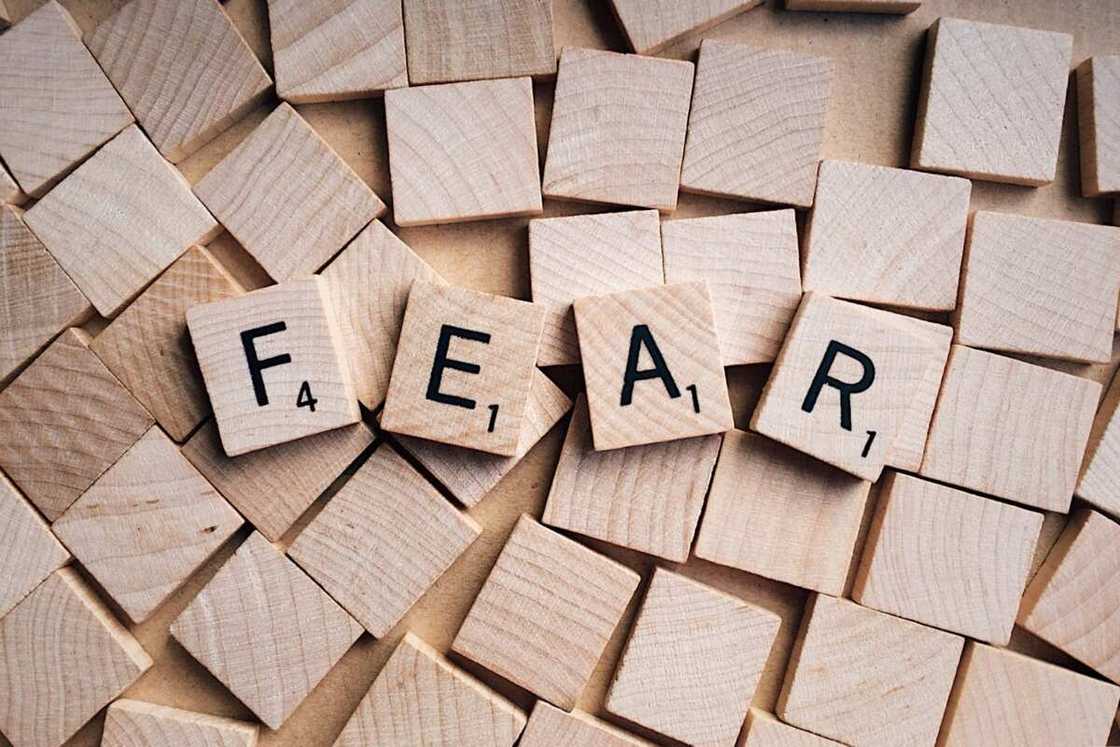What is atychiphobia: Definition, pronunciation, common symptoms
Are you afraid of asking for a raise because you presume that your boss will say no, even though you really deserve it? Do you hold off on specific goals because you are too scared about failing? You may have atychiphobia, also known as the fear of failure.

Source: UGC
As humans, we fear certain things, but when this fear begins to control our lives and undermines our quality of life, it becomes a phobia.
A phobia is generally referred to as an irrational fear related to a specific object or situation. The situation, in this case, is failure.
Sure, you may be thinking, "No one likes to fail!" And while you are right, there is a big difference between avoiding failure and fearing it so much that you continually think that you will fail at everything. Enter atychiphobia.
But what is atychiphobia anyway? What is atychiphobia meaning?
Atychiphobia definition

Read also
IK Ogbonna sounds heavy note of warning on personal hygiene: "Use wipes to freshen up down there"
What is the definition of atychiphobia in simple terms? This is the unwarranted chronic and persistent fear of doing something wrong in your life or making any mistake.
Anything that signals failure will result in internalized shame, more fear, and increased anxiety. In some severe cases, atychiphobia can result in depression and feelings of learned helplessness.
Many people simply define atychiphobia as a fear of failure.
Atychiphobia pronunciation
How is the word atychiphobia pronounced? The 'ch' in the word is pronounced as a 'k' sound.
Atychiphobia symptoms
Physical symptoms of atychiphobia may include:
- Difficulty breathing
- Unusually fast heart rate
- Tightness or pain in your chest
- Trembling or shaking sensations
- Dizziness or lightheadedness
- Digestive distress
- Hot or cold flashes
- Sweating
Emotional symptoms of the phobia include:
- An intense feeling of panic or anxiety
- An overwhelming need to escape a situation that produces the fear
- Feeling detached from yourself
- Feeling like you've lost control over a situation
- Thinking that you may die or pass out
- Feeling like you have no power over your fear

Source: UGC
Signs that you may have atychiphobia
You may take an atychiphobia test to find out if you have this phobia, but remember, nothing beats a doctor's diagnosis.
Some of the atychiphobia tests on the internet conclude that you may have atychiphobia if:
- Failing makes you worry about what other people think about you.
- You get distracted by tasks that prevent you from preparation, which were not as urgent as they seemed at the time.
- Failing makes you worry about your ability to pursue the future you desire.
- You tend to tell people beforehand that you do not expect to succeed to lower their expectations.
- Failing makes you worry that people will lose interest in you.
- Once you fail at something, you have trouble imagining what you could have done differently to succeed.
- Failing makes you worry about how smart or capable you are.
- You often get last-minute headaches or other physical symptoms that prevent you from completing your preparation.
- Failing makes you worry about disappointing people whose opinions you value.
- You tend to procrastinate and "run out of time" to complete your preparation adequately.

Source: UGC
What causes atychiphobia?
The intense fear of failure may be caused by:
- Past experiences where you have failed, especially if the experiences were traumatic or had important consequences, like missing out on a significant job opportunity.
- Being a perfectionist.
- Watching someone else fail, also known as "observational learning experience."
- Reading or hearing about someone else's experience, also known as "informational learning."
- Genetics.
- Having a tough childhood, such as having unsupportive parents or being bullied at school.
- Worrying about how others perceive us.
- Lack of self-confidence.
Treatment of atychiphobia
Treatment for phobias like atychiphobia is individual to each person. In general, the main goal of treatment is to improve your quality of life.
If you have multiple phobias, your doctor will likely treat them one at a time.
Treatment options may include one or a combination of the following:
- Psychotherapy
- Medication
- Lifestyle changes

Source: UGC
How to overcome a fear of failure and atychiphobia
Here are some methods on how to overcome the fear of failure:
1. Visualize the worst-case scenario
In some cases, the worst-case scenario may be genuinely disastrous, and it may be perfectly rational to fear failure. In other cases, however, this worst-case may actually not be that bad, and recognizing this can help.
2. Redefine failure
Redefine what it takes to fail. Many successful people believe that the only way to truly fail is to give up on your goal.
3. Reframe failure
Reframe your way of thinking about failure. Instead of seeing failure as a negative thing, try to look at it as a positive.
Failure can be a learning experience. Remember that most people do not succeed straight away, there will be mistakes and failures along the way.
These experiences can help you learn and improve until you succeed.

Source: UGC
4. Visualize your failure
Being able to visualize yourself facing your failure and growing stronger from it, and accepting it can be a great tool.
5. Adopt a new mindset
Adopt the belief that there is no failure, only feedback. That way, you will develop the mindset that undesirable outcomes are opportunities to learn and get better.
6. Be kind to yourself
A big part of why we are scared of failing can be due to our lack of confidence, or a strong desire for perfection. You should always try and treat yourself as kindly as you can.
Treat yourself with sympathy and understand why you are feeling a certain way.
7. Learn from your past
Learning from your past is also a great way to change your mindset and face your fears once again. Taking notes and writing down how you feel, what happened, and why can help you to face your fear of failure in the future.
This can help you as you are able to analyze the things that happened in the past to trigger this feeling and how you overcame it.
By writing down all of this, you can see what does and does not work for you, including any challenges you faced and how you dealt with them.
8. Learn from your idols
Watch or read stories of those people you admire. In virtually all cases, they will have experienced massive failures on their road to success.
9. Be more optimistic
Positive thinking is an incredibly powerful way to build self-confidence and neutralize self-sabotage.
10. Analyze all possible outcomes
This can help you put things into perspective and see that failing is not the worst thing that can happen.
11. Expose yourself to failure
Try something new that you are unskilled in and may make mistakes in too. This will show you that mistakes are not as scary as they may seem to you right now.
12. Swap perfection for progress
In many cases, those with a fear of failure have unrealistic expectations of what it means to succeed. By focusing on progress, you have many victories and opportunities to learn and reduce your ability to fail.

Source: UGC
13. Have a plan B
If you are afraid of failing at something, having a "Plan B" can help you feel more confident about moving forward.
Quotes about failure
You can learn a thing or two from these quotes about failure:
- Success is not final, failure is not fatal: it is the courage to continue that counts. - Winston Churchill
- The phoenix must burn to emerge. - Janet Fitch
- There is only one thing that makes a dream impossible to achieve: the fear of failure. - Paulo Coelho
- Everything you want is on the other side of fear. - Jack Canfield
- It's failure that gives you the proper perspective on success. - Ellen DeGeneres
- Only those who dare to fail greatly can ever achieve greatly. - Robert F. Kennedy
- I have not failed. I've just found 10,000 ways that won't work. - Thomas A. Edison
If you think that you may have atychiphobia, the best thing to do would be to get a doctor's diagnosis so you can begin working on it. And remember, "Don't fear failure so much that you refuse to try new things. The saddest summary of a life contains three descriptions: could have, might have, and should have. – Louis E. Boone"
DISCLAIMER: This article is intended for general informational purposes only and does not address individual circumstances. It is not a substitute for professional advice or help and should not be relied on to make decisions of any kind. Any action you take upon the information presented in this article is strictly at your own risk and responsibility!
READ ALSO: What is philophobia? 7 signs you might be suffering from it
Legit.ng reported about philophobia, also known as the fear of falling in love. This phobia is characterized by carrying a lot of emotional baggage from past events in your life, an inability to trust anyone, and feeling extremely awkward after being physically intimate with someone.
The good news is like any other phobia, this one can be treated.
Source: Legit.ng










